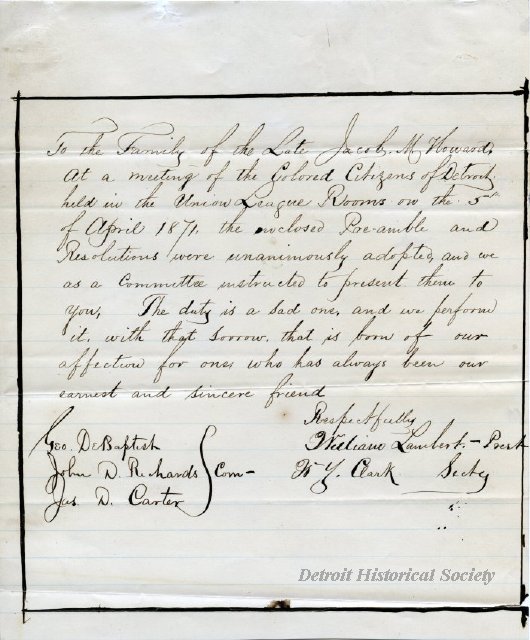George DeBaptiste was an African American entrepreneur who made significant contributions to the Underground Railroad in Detroit, and Madison, Indiana. He was born in Fredericksburg, Virginia, around 1815, to free black parents. After completing a rudimentary education, he became a barber. In his late teen years, he was hired as a valet by a wealthy Southerner and traveled the South. Thereafter, he married Lucinda Lee and the two moved to Madison, Indiana in 1838.
Living on the northern border of the Ohio River, DeBaptiste worked as a barber while assisting as a conductor on the Underground Railroad, helping escaped slaves cross the river from Kentucky into free Indiana. He challenged an Indiana law that required free blacks to pay a $500 bond for residence, winning the case but not overturning the law. DeBaptiste was hired by General William Henry Harrison as his personal valet through his presidential election campaign. When Harrison was elected in 1840, DeBaptiste joined him in Washington D.C. as steward. Harrison died after 32 days in office and DeBaptiste returned to Madison where he assisted more than 180 former slaves escape to freedom. Harassed because of his Underground Railroad activities, he left for Detroit.
DeBaptiste and his family arrived in Detroit in 1846. An industrious man, not only did he resume his career as a barber, but also worked as a sales clerk, bought a bakery, and eventually bought a steamship, the T. Whitney. Black men were not allowed to captain ships, so he hired a white man to pilot the boat, and ferried cargo – including “black wool” (freedom seekers) – across the Detroit River to Canada.
DeBaptiste’s organizational skills are noteworthy. He was instrumental in forming the Colored Vigilant Committee, and The Order of the Men of Oppression (also known as The African American Mysteries), two secret societies that helped run the Underground Railroad in Detroit. He attended the meeting of Frederick Douglass and John Brown in Detroit on March 12, 1859 where Brown’s pending raid on the Harper’s Ferry Armory was reportedly discussed.
Once the Civil War began, DeBaptiste helped recruit for a regiment of black soldiers, eventually known as the 102nd U.S. Colored Troops, and became the unit’s sutler, responsible for providing provisions. The unit was stationed chiefly in South Carolina. When DeBaptiste returned to Detroit, he bought an ice cream parlor and started a catering business. More importantly, he continued his life’s work of helping fellow African Americans, assisting the Freedmen’s Aid Commission in obtaining supplies for Louisiana’s Freedmen Schools.
George DeBaptiste died of cancer on February 22, 1875. His home site at East Larned and Beaubien streets is commemorated by a Michigan Historical Marker.
RELATED ITEMS IN THE COLLECTION
View all items related to George DeBaptiste
